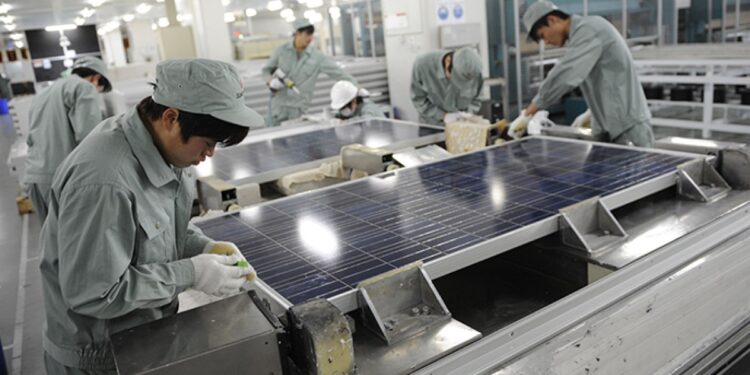At a factory located in Shaanxi Province (central China), China’s leading position in the global solar industry is evident. Robots at the LONGi Green Energy Technology facility handle square strips of polysilicon, convert them into solar cells and then assemble them into solar modules. The factory can produce approximately 16 million cells per day.
According to the Economist, China dominates every stage of the solar energy supply chain, with the production capacity of modules reaching nearly 1,000 gigawatts last year, nearly 5 times what the rest of the world produces combined, according to Wood Mackenzie, a consulting firm.
The Economist says that since 2021, China’s capacity has tripled, far exceeding global demand despite efforts by other countries to boost domestic production.
Falling prices and profits
This rapid expansion has driven down the cost of solar energy, benefiting consumers but cutting into profits from the industry, the Economist reported.
Prices of polysilicon, wafers, cells and modules fell below production costs, causing Chinese solar export revenues to decline by 5.6% last year despite increased volumes.
While LONGi’s share price has fallen by 60% since the beginning of 2023, prompting the company to announce a 5% workforce reduction last March due to the “increasingly complex and competitive environment.”
Other major Chinese solar companies, including Trina Solar, JA Solar, and Jinko Power, also saw significant declines in their share prices, according to The Economist.
While small businesses were hit harder, with some canceling expansion plans. For example, Lingda, a smaller manufacturer, canceled a $1.3 billion factory project.
Jana Hryshko of Wood Mackenzie points out that larger companies can withstand a price collapse better because of their diversified operations, while smaller companies face the risk of complete collapse.
Excess capacity and state support
China’s overcapacity problem shows no signs of abating. Despite the financial pressures caused by falling prices, leading companies continue to update technology and expand production to maintain competitive marginal costs, according to the Economist.
Wood Mackenzie expects the capacity of China’s solar industry to reach nearly 1,700 gigawatts by 2026.
According to the Economist, state support exacerbates the supply glut. Local governments provide various forms of assistance, including free land, electricity, interest-free loans, and access to advanced technologies.
Usha Haley of Wichita State University estimates that such subsidies could cover up to 35% of a solar company’s costs, and potentially as much as 65% in some cases.
This support is crucial, especially as local governments look to compensate for revenue losses resulting from the faltering real estate sector.
However, with many Chinese provinces facing ballooning debts, such generous support may not be sustainable.
Solar companies are also competing for government aid with other industries struggling with excess capacity. According to the newspaper, more than 5 Chinese industrial companies did not achieve profits last year.



